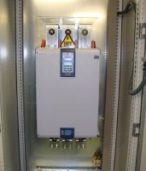Weg Supplies Drive Systems for Algerian Water Project

Weg is a key supplier of inverter drive systems and soft starters to the Spanish consortium that is constructing the Tlemcem-Honaine desalination plant, located near the Algerian city of Oran, close to the border with Morocco. When complete the Tlemcem-Honaine plant will be one of the largest in the world. It will have has a production capacity of 200,000 cubic meters of drinking water a day, enough to meet the direct needs of 750,000 people. Algeria is the second largest country in Africa, with 33-million inhabitants, and water is extremely scarce. The Sahara desert, the largest in the world, covers more than 90 percent of the national territory. This means that the area Algeria can set aside for crop cultivation is very limited. Unfortunately, this situation is unlikely to improve; in fact estimates show that, in 30-years, the amount of water available per person in the north of Africa will be reduced to 80 percent, compared to today.
Planning ahead for this eventuality, the government of Algeria is making large investments in seawater desalination projects: specifically, the construction of three large desalination plants, with a total production capacity of 500,000 cubic metres of water a day, providing drinking water for a population of three- million. Two of these plants have already been built and are operational, with the third, the Tlemcem-Honaine plant, presently under construction.
Weg's role in this prestigious project is the supply of soft starters and frequency inverters for the pumps that will extract water from the Mediterranean Sea at Honaine. The contract for the equipment was secured by Weg Iberia, Spain, through its distributor Flomitec, a company specializing in drives and controls for electric motors. The Weg equipment has been integrated into electrical control panels by Electricidad Tebar, a company that specializes in the assembly of electrical control panels for use in water sector infrastructures. The equipment has already been delivered to the Algerian Energy Company: it will provide soft starting and speed variation for the extraction pumps, which will result in higher efficiency, energy saving and improved reliability.
The investment by Algeria in the three plants totals $400 million. In an interview with the Algérie Presse Service, the Minister delegate to the State Minister of Interior and Local Communities of Algeria, Daho Ould Kablia, said that the country will invest $19 billion in the water supply sector up to 2014, with the objective of expanding the supply of water per person to 165 liters per day.
In addition to desalination plants, further investments will be made in the construction of dams and for sanitation. According to Daho Ould Kablia: "With the new program, the Algerian government intends to find a balance between the different regions of the country, and provide a fair supply and distribution of water and the services related to it."
Fresh water is scarce in the world. Although two-thirds of the planet is made up of water, only around 3 percent is fresh water suitable for consumption, irrigation or for use in industry. However, seawater is plentiful. For many countries, the only policy is to make large investments in technology to desalinate sea water and use the resulting liquid for consumption. There are approximately 14,000 desalination plants worldwide, most of them in the Middle East. According to data from the International Desalination Association, they produce today over 59.9 billion liters of water per day.
The desalination of water is achieved through a process known as reverse osmosis. High pressure pumps draw the solution making it pass through semi-permeable membranes, which are like filters. The salt is retained in these membranes and what comes out on the other side is a "pure" water solution.





